|
I
wanted to give you a little more insight into what
The Water School is all about, the caliber of
people who carry out its work and why it has
gained so much support with the domain industry. I
decided the best way to do that would be to share
a recent chat with Sandra Getuba with
you.
DN
Journal:
Sandra, letís start from the beginning. Tell us
where you born and a little bit about your birth
place and family growing up.
|

Sandra
Getuba
Director of Development
The Water School |
Sandra
Getuba: I was born in Kenya
in a little town called Kendu Bay located
on the shore of Lake Victoria.
Kendu Bay by the way is the birthplace of Barack
Obamaís father! In those days, good
hospitals were not common in Africa so my
mother traveled to a little mission
hospital on Kendu Bay. It was a difficult
trip and unbeknownst to her, she was
carrying triplets. Two did not
survive. But I did and all my life I have
always had the feeling that the
circumstances of my birth indicate that I
am here for a special reason. I
donít know what it is (still trying to
figure it out!) but I know itís
definitely to do with helping those less
fortunate than I am.
My
parents were young university students
when they had my younger sister and I. We
lived in Nairobi (the capital city
of Kenya) but we traveled to the village
almost every school holiday to spend time
with our grandparents, cousins and other
relatives. Life in Nairobi vs. life in the
village was very different. In the city we
had access to all things modern. In the
village, my cousins and I spent our days,
fetching water from the river, collecting
firewood, tending to the garden, picking
tea and yes, grazing cows! It was
important to my parents that we stayed in
touch with the way of life of millions of
Kenyans lest we take our own lives for
granted. They wanted us to appreciate what
we had and at the same time, be
compassionate to those who had less than
we did.
|
DN
Journal: At
what point in your life did you start thinking
about what you might want to do with your life and
how you could go about accomplishing your goals?
Sandra
Getuba: Growing up, my friends
used to tease me that one day I would be a
humanitarian of some sort. I was a tiny little
thing with a smart mouth who often rushed to the
defense of kids being picked on by bullies. At the
time, my compassion for those who could not defend
themselves was the driving force behind my
recklessness. That temperament diminished over
time but I never stopped empathizing with the less
fortunate. I have always known that I wanted to
help them in some way. When I went abroad to
study, I became even more aware of the injustices
that people in developing countries face as they
struggle to secure basic needs such as water,
food, education and shelter. I knew that I was
very lucky to have the opportunities that had
brought me to where I was and I knew that one day
I wanted to give back to my own people in
some capacity, to give a voice to the voiceless. I
had no idea how but I knew the first step was to
finish my studies first then figure out the next
step.
DN
Journal:
Cultures around the world vary greatly. Were there
any particular obstacles in your country that a
young woman has to pursue a career or particular
goals?
|
Sandra
Getuba: Even in these
modern times, there are many obstacles
that young women in Africa face when
trying to pursue their careers. How they
overcome them depends a lot on the level
of education they have and the kind of
support they get from their own families.
Most obstacles pertain to the
vulnerability of women in African
societies which are structured in a way
that prevent them from pursuing successful
careers. For example, many communities
(especially in the rural areas) marry off
young girls before they have a chance to
finish high school or even primary school
in some cases. Once this happens, they
have very little hope in having a career
of any sort. Women are expected to play
the role of wife and primary caregiver and
which takes precedence over everything
else. It is difficult to break this
mentality especially in the rural areas. |
| Some
career obstacles that young women face are
similar to what we sometimes see out here
in the west. Those who manage to pursue
careers face significant challenges in the
workplace with regard to advancing up the
corporate ladder or even getting the same
salaries as their male counterparts.
DN
Journal:
You wound up going to Australia for
college. Tell us how that came about and
what stands out in your mind about your
years there.
Sandra
Getuba: My parents
valued education and they sacrificed a lot
so that my siblings and I would go to good
schools. My mother was the first girl in
her entire village to go to university.
When I completed my high school, they
decided to send me to Australia for my
university studies. Universities in Kenya
at the time were pretty unstable. Riots
were common and they often forced local
universities to shut down such that a four
year degree would take 6 years because of
constant interruptions. Parents |
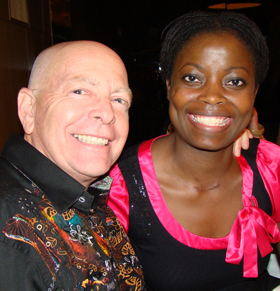
One
of The Water School's most
fervent supporters, Gregg McNair (PPX
International), with Sandra Getuba at
T.R.A.F.F.I.C. Vancouver - June
2010 |
| who
could afford, or rather barely afford,
sent their kids abroad to study in places
like the U.S., UK, Canada, Australia or
even India. Most would put their kids on a
plane with the first semesterís fees and
then it was up to them to take care of
themselves for the rest of their studies.
This usually has unfortunate consequences
because it is unbearably difficult for
kids to earn a living to pay for fees and
living expenses all while studying. Most
cannot cope and they drop out, go
underground (because they violate their
visa status) or go back home. |
|
My
mother traveled to Australia on business
and was impressed by its people and
beauty. She collected some brochures and
application forms for me and we applied to
at least 5 universities. University of
Wollongong (located an hour and a half
south of Sydney) responded with
impressive speed so that is where I ended
up. So at nineteen and never having left
the country, much less my parentís home,
I was shipped to Australia to study. The
deal was that I would work for my living
expenses and my parents would pay my fees.
My sister joined me a couple of years
later and while it was nice to have
family, it was a difficult burden on my
parents. A few times, |
|

Sandra
Getuba (at far right) chats with
guests at a dinner honoring The Water
School
hosted by domain investor Richard
Lau
in Vancouver, Canada - June 2010 |
they
relied on the goodwill of relatives and
friends to fundraise or borrow money to
pay for our fees. In my final semester,
they had just about exhausted every
option. My sister suspended her studies so
I could finish mine and my parents sold
their last piece of land to pay my fees. I
was still about $1,000 dollars short and
was not going to graduate unless I paid
the balance. A few amazing Australians put
together a quick fundraiser and raised
that money for me without my knowing it. I
graduated knowing that it was the kindness
and charity of a few human beings that
made it possible.
DN
Journal:
After you completed college, tell us about
the career path that led you to Canada
and an eventual connection with The Water
School?
Sandra
Getuba: I studied
Psychology in university which gave me
insight into human relations but I knew it
was |
| not
going to solve the worldís problems. As
soon as I moved to Canada, I enrolled in a
postgraduate program in International
Project Management at Humber College
in Toronto. It was an intensive,
practical program that focused on
international development issues. I did a
six month internship in Tanzania
with a microfinance NGO which further
opened my eyes to the issues that Africans
face. |
As
soon as I came back to Canada, I was diagnosed
with Lupus which forced me to slow down and focus
on my health for a while. This setback prevented
me from going back to Africa to work because I
needed to have access to a good healthcare system.
I fell into fundraising quite by accident
after getting a job as a Project Coordinator with
a leading fundraising management firm called
Ketchum Canada Inc (KCI) based in Toronto.
While there, Fraser Edwards approached me to draft
a funding proposal for The Water School which he
had just started with Bob Dell.
| I
moved to Edmonton shortly
afterwards and continued to build my
fundraising experience as a Fundraising
Coordinator at Ronald McDonald House.
I continued to maintain contact with
Fraser Edwards and occasionally bugged him
for a job with The Water School but the
timing was never right. Eventually, the
need for The Water School to expand its
programs and increase staff could not be
put off any longer. Neither could my
desire to work for a charity that is
involved with international development.
On April 1st 2010, I started my role as a
Director of Development for The Water
School. In a nutshell, it is up to me to
raise funds for The Water School programs
in Africa (and wherever we expand to in
the future) and to help raise awareness in
communities across Canada on the work that
we do and that impact that we are having. |
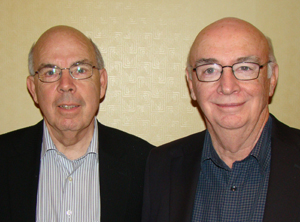
The
Water School's founders:
Bob Dell (left) and Fraser
Edwards. |
DN
Journal:
The Water Schoolís system for bringing clean
drinking waters to developing nations is so
efficient and cost effective and it is easy to see
why anyone would want to get involved. Of course,
you have a personal history with a continent where
the Water School has been especially active so
have a unique perspective. From your viewpoint,
tell us what you thought about the program when
you were introduced to it and the good you have
seen it do first hand.
Sandra
Getuba: Back in 2007 when Fraser
Edwards approached me for help with a funding
proposal, I began to research on solar
disinfection (SODIS). I was completely
blown away by the whole concept and the potential
impact it could have on my own people. I had seen
firsthand the effects of drinking contaminated
water. I have numerous little cousins and
relatives that suffer untold misery as a result of
waterborne diseases and I could see how an
organization like the Water School could change
their lives. I have an eleven year old cousin out
in the village called Moraa. We share the
same name because we are both named after our
great grandmother. Her father (my uncle) died of
HIV/AIDS about 3 years ago and my grandmother
helped their mother look after Moraa and her
siblings until she died last year. Ever since
Moraa was a little girl she was always home sick
with diarrhea and stomach pains. It was discovered
years later that her symptoms were related to
Typhoid, a serious waterborne disease that plagues
thousands of people in Africa. Moraa, a very
bright girl, had missed so much school that she
had to repeat a couple of grades.
|
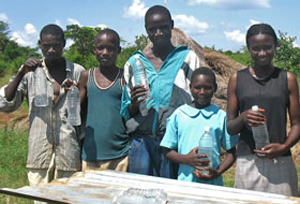
A
few of the many people helped by
The Water School's efforts in
Kenya. |
The
Water School program significantly impacts
the lives of families and school children
like Moraa. Most families are too poor to
afford firewood to boil water or buy
chlorine tablets or filters to treat their
water. Children miss countless of days of
school because they are too sick from diarrhea
to attend school. The program that we run
at The Water School ensures that children
like Moraa do not have to miss school. It
gives people an alternative method of
treating water that is effective, simple
and affordable.
My
dream is that The Water School program
will reach every village in Africa. People
need not suffer and children need not die
because of preventable waterborne
diseases. We at The |
| Water
School look at the work we are doing as a
movement, an organized effort to bring
about positive, lasting change in
communities which do not have access to
clean drinking water.
|
DN
Journal:
Fraser Edwards has said that you are part of a
team of young people that he and Bob are mentoring
so their work will continue after they have gone.
Tell us about how the relationship between Fraser,
yourself, James and Brad and what you have learned
from the Water School founders.
Sandra
Getuba: Fraser and Bob (I,
respectfully, call them the old guards!)
have always had the vision that The Water School
movement would be carried forward by young people
who are committed to issues the organization is
trying to address. Bradley Pierik is
studying his Masters in Chemical Engineering at
the University of British Columbia and the
idea is that he will continue to keep The Water
School at the forefront of cutting edge research
where water treatment technology is concerned. He
is developing a relationship with Eawag, a
Swiss federal water research organization that is
the world leader in SODIS research and that
implements SODIS projects in 24 countries. James
Morfopolous, also a Masters student, recently
came on board to assist with our marketing and
communications efforts. He is focusing right now
on the promoting and coordinating the Mount
Kilimanjaro climb that will take place
in March 2011.
The
three of us bring a youthful and fresh perspective
to The Water School that Bob and Fraser find very
valuable. On the other hand were learning a lot
from Bob and Fraser who have many years of
experience in doing what they do. We have to
sustain the vision and put measures in place now
that will make sure that The Water School vision
outlives us all.
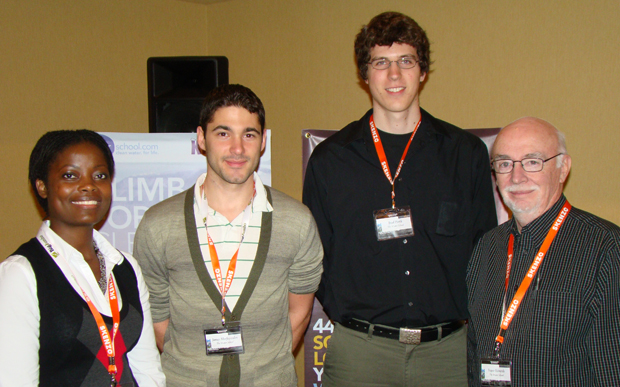
The
Water School staff members (left to
right) Sandra Getuba,
James Morfopoulous and Brad Pierik
with Water School Co-Founder Fraser
Edwards.
DN
Journal:
Many people in the domain industry have begun
supporting Water School efforts. Tell us a little
bit about how much good even a small donation can
do. Also, how can those who want to lend a hand
best support the effort?
Sandra
Getuba: At the recent T.R.A.F.F.I.C.
conference in Vancouver, I got to meet
and talk to a few of people in the domain industry
who are supporters of the Water School and I was
amazed by their level of commitment and
dedication. They have a sincere desire to see The
Water School grow and impact more people. For most
of them, it took a trip to Africa to visit our
projects or to participate in the Mount
Kilimanjaro Climb for Clean Water (or both)
for them to be convinced that the need is real and
the impact of our program is profound.
The
Water School relies on donations to carry out our
mission. Every dollar helps. $50 will
provide clean water to an entire family of
five. For life. For a lot of people $50
is nothing. But for thousands of people in Africa,
it is a matter of life or death. It is everything.
It means that a mother does not have to worry
about her children getting sick from drinking
contaminated water. It means that a child does not
have to miss school.
|
There
are several ways in which people in the
domain industry can lend their support to
The Water School. They can participate in next
yearís Mount Kilimanjaro Climb for Clean
Water that will take place in
March 2011. If they are unable to do so,
they can sponsor a climber or they can
make a direct donation to The Water School
through our website or by mail. Please
visit www.waterclimb.com
for more information. Alternatively, they
can get in touch with James Morfopoulos
at [email protected]
or by phone at 778-829-0073.
We
welcome and are always thankful for
donations (no matter what the amount is).
Donations can be made directly on our
website www.thewaterschool.com
or by mailing a cheque to 112 Lakeside
Views Strathmore, Alberta Canada
T1P 1Z7. Charitable tax receipts are
issued with every donation.
Thanks
to a very generous donor, our 2010
administrative expenses are taken care of
so 100% of the donations go directly to
The Water School projects! |
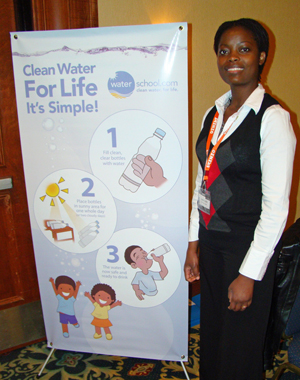
|
|

